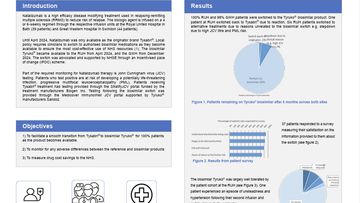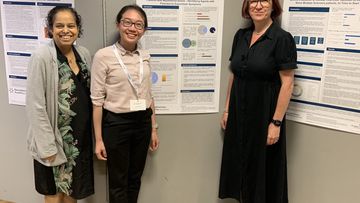Triptans and medication overuse headache: a local picture and management strategies
Poster
New treatment options for migraine prophylaxis have given hope to many patients suffering from migraine. To make these options economically sustainable a local headache pathway has been developed to support primary care clinicians assess and refer patients appropriately. 1 to 1.5 percent of the population (around 8400 patients in East Sussex) suffers from medication overuse headache (MOH). MOH was identified as exclusion criteria to be referred to secondary care, so a system to identify and review these patients has become very relevant.
This project has been pilot and implemented in general practice.
The objectives of the quality improvement project were to identify patients at risk or suffering from MOH, have an initial consultation (for confirmation and educational purposes), discuss recommendations with the clinicians in terms of management strategies or referral criteria, feedback to the prescriber at the surgery, and present the data and final recommendations to prescribers of that surgery and the CCG.
The review identified 84% of patients having MOH and an additional possible 9.7% who had no clear recollection of their headache frequency. Interesting data emerged regarding opioid prescribing (22.6% of patients) highlighting the impact they can have on medication overuse. On patient education perspective, a strong recommendation was to keep a headache diary (96% were not) and explaining MOH at the time of first prescribing (100% of the patients did not know what MOH was). Important suggestions on consultation structure were made, and prescribers were made aware of the prescribing trend of the selected surgery along with potential strategies for implementation to avoid MOH.
There is a potential development of the project in a larger scale and a pharmacist would be in an ideal position due to advanced consultation skills and monitoring progress through repeated appointments, as well as delivering the educational role.
Aim
To audit the number of people diagnosed with migraine in one surgery of Sussex Healthcare who had been prescribed a high number of triptans and were therefore at higher risk of medication overuse headache (MOH).
Headlines
The prevalence of Medication overuse headache has been estimated as 1-1.5% in the general population, so in East Sussex around 8.400 patients can be affected.'
128 patients were identified as prescribed triptans in the selected surgery, of which 36 were receiving more than 10 tablets of triptans a month for the last 3 months (28%). 31/36 patients were contacted.
100% of patients did NOT know what MOH was.
The data collected is likely an underestimation of the problem due to only patients with diagnosis of migraine being selected for review (not including patients with only diagnosis of headaches, clusters etc.) and the lack of data on the electronic system of the surgery regarding OTC overuse.
Key findings
84% were having MOH with 9.7% additional patients having possible MOH (patient recollection uncertain).
22.6% had opioids prescribed with an average of 15 tablets of triptans per months were prescribed (12-48/month)
29% had prophylactic therapy failure
6.4% started prophylactic therapy after my review.Patient education:•96% of patients were NOT keeping an headache diary
100% did NOT know what MOH was.Consultation structure:
35.5% of patients were taking OTC medications (6 opioids, 5 ibuprofen, 8 paracetamol, 2 combined analgesic
Some patients were not appropriately managed
Changes to practice made
Suggestions were made for local prescribers to improve practice :
Limit amount of triptans prescribed to 10 tablets/month
Inform patient of MOH at the time of first prescribing and reiterate in following reviews. Use brochure/leaflets to help information retention.
Recommend headache App to empower patients to take control and manage their condition.
OTC enquiry should be part of history taking•Discourage opioids use/prescribing
Consider MOH before considering prophylactic failure
Signpost patients to support groups like dependence forming medication team
Additionally a suggestion was made for the local clinical commissioning group (CCG) to include amitriptyline in the local formulary as per NICE.
Core recommendations
Develop patient-facing information to help reduce this risk,
Extend this work to a national level.
Take action
Review the poster to understand the fuller details of the project.
Consider repeating a similar project in your own area to support gathering of this information for a national picture.
More Neuropharmacy Academy Medication Projects


Developing neuropharmacists, supporting collaborative care
Knowledgeable pharmacists can initiate or support new treatment pathways, play an important role in patient education, medicine adherence, efficacy and safety, and provide advice to other healthcare professionals involved in the person's care. This Academy recognises the value of this essential role, and seeks to enhance pharmacist's clinical skills and build their confidence in managing a range of neurological conditions.